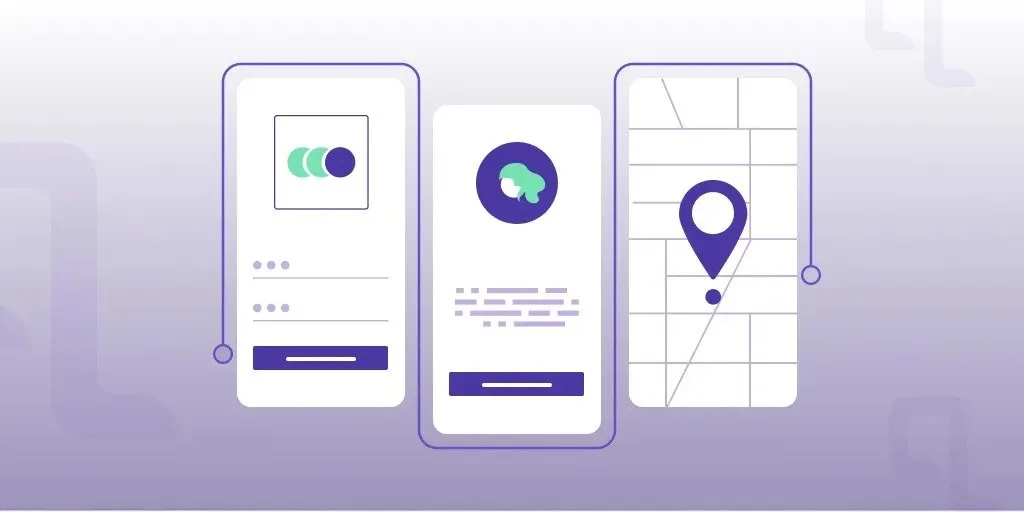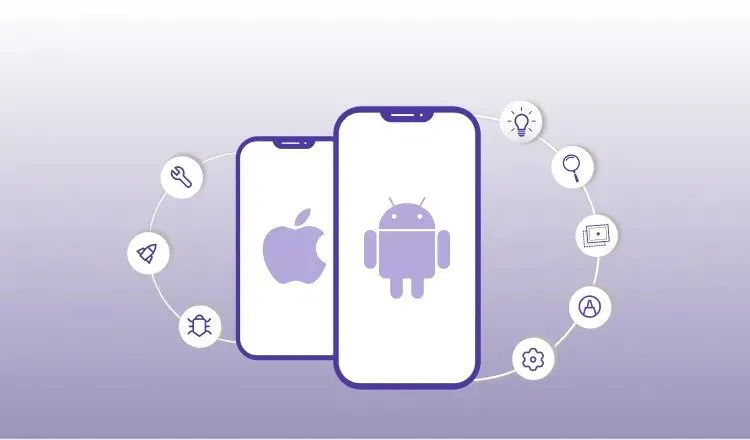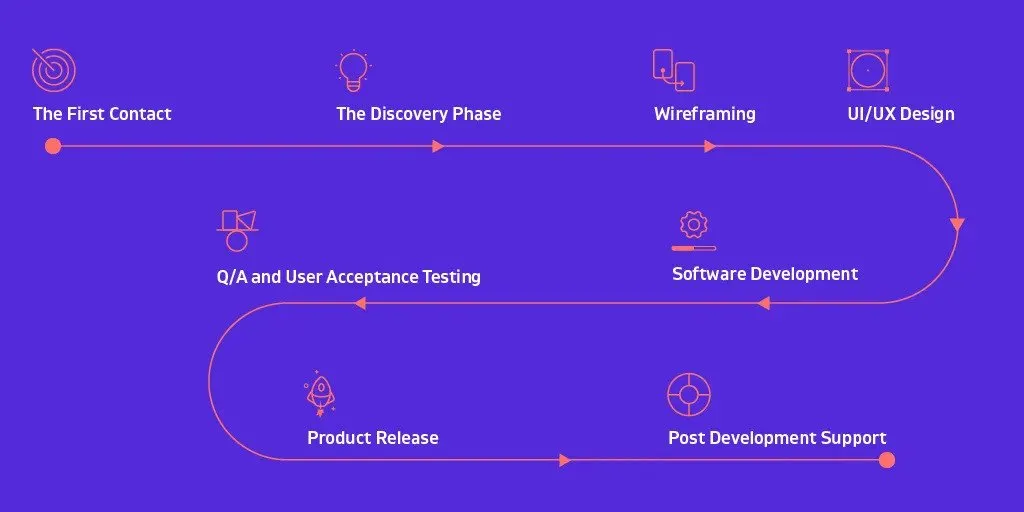Technology


9 min


Developing a mobile app can be a daunting task. Our comprehensive guide to mobile app development walks you through the entire process. Get step-by-step instructions on how to create and launch your own mobile app, from idea to reality.

By Digvijay Singh Tomar
11 Feb, 2022
Mobile applications have become integral to our lives in today's digital age. Whether for communication, entertainment, productivity, or e-commerce, mobile apps offer convenient and efficient access to services and information.
Understanding the development process is essential if you have a brilliant app idea or want to expand your business through a mobile app. In this step-by-step mobile app development process, we'll take you through the entire journey of turning your app concept into a reality.
However, before discussing the mobile/android app development guide, let’s understand why it is important.
In today's fast-paced and technology-driven world, mobile app development trends have become increasingly crucial for businesses of all sizes and industries. Whether a small startup or a large corporation, having a mobile app can offer many benefits to help your business thrive and stay competitive. Here are several compelling reasons why businesses should consider investing in mobile app development:-
Broader Reach and Accessibility: Mobile apps connect with a vast global audience around the clock, allowing users to engage conveniently from anywhere.
Enhanced Customer Engagement: Apps provide personalized experiences through push notifications and tailored content, increasing customer retention.
Competitive Advantage: Staying relevant in your industry, where mobile apps are now essential, demonstrates your commitment to customer service.
Brand Visibility and Recognition: A well-designed app boosts brand visibility and fosters consumer trust through constant reminders on users' devices.
Improved Customer Loyalty: Loyalty programs, discounts, and rewards through apps foster ongoing customer engagement and loyalty.
Enhanced User Experience: Faster and more responsive than websites, apps deliver an enjoyable and efficient user experience.
Data and Analytics: Mobile apps offer insights into user behavior, aiding data-driven decisions and improved product offerings.
E-commerce and Revenue Generation: Apps open new revenue streams, particularly in e-commerce, by offering seamless shopping experiences and increasing sales.
Customer Support and Communication: Apps streamline customer support and communication, making it easy for users to seek assistance or provide feedback.
Adaptability and Innovation: Apps are flexible, allowing for ongoing innovation and adaptation to evolving customer expectations.
Mobile app development is a strategic investment offering competitive advantages, improved engagement, and growth opportunities, making it an integral part of a business strategy for long-term success.
Keep reading:- How 5G Impact on the Mobile App Development?

Defining your idea is the first and most crucial step in mobile application development. Start by identifying the problem your app will solve or the value it will provide to users.
Research the market and potential competition to ensure your idea is unique and has a target audience. Creating a clear and concise app concept is the foundation for the development process.
After you've defined your app idea, conducting thorough market research is essential. It includes understanding your target audience, their needs, and their preferences. Investigate your competitors and identify what sets your app apart. Market research provides valuable insights to refine your app concept and make informed decisions throughout development.
Keep reading:- Optimizing iOS Apps for Diverse Screen Sizes and Resolutions
It is one of the crucial steps in the mobile app development projects. A well-thought-out plan is essential for a successful mobile app development project. Create a detailed project plan that includes the following:
1. Define Objectives: Clearly state your app's objectives, including what you want to achieve and how you'll measure success.
2. Choose the Platform: Decide whether you want to develop your app for iOS, Android, or both platforms. Your choice should align with your target audience and business goals.
3. Set a Budget: Determine your budget for app development, including design, development, marketing, and ongoing maintenance.
4. Select Development Tools: Choose the development tools and technologies that suit your project, such as programming languages, frameworks, and databases.
Create a Timeline: Set project milestones and deadlines to ensure a smooth and efficient development.
Before diving into coding, creating wireframes and designing mockups is essential. Wireframes are basic visual representations of your app's layout and user interface, while design mockups offer a more detailed look at the app's appearance. These visual representations help you and your development team envision the app's user interface and user experience (UI/UX).
The development phase is where your app idea starts taking shape. There are several key elements to consider during development:
1. Back-End Development: It involves building the server, database, and application logic. Choose a technology stack that aligns with your project requirements.
2. Front-End Development: Create the user interface and experience (UI/UX) using programming languages and frameworks compatible with your chosen platform.
3. Mobile App Testing: Rigorously test your app to identify and fix bugs, usability, and performance problems. Ensure it functions smoothly on various devices and operating systems.
Keep reading:- Backend Frameworks Impacting Mobile App & Web Development?
Testing is another mobile app development process to ensure your app is free from critical issues and provides an excellent user experience. The testing phase typically includes the following types of testing:
1. Functional Testing: Verify that all features and functionalities work as intended.
2. Compatibility Testing: Ensure the app works seamlessly on different devices, screen sizes, and operating systems.
3. Usability Testing: Gather feedback from real users to improve the user interface and experience.
4. Performance Testing: Assess the app's speed, responsiveness, and scalability.
5. Security Testing: Identify and address potential vulnerabilities to protect user data and the app.
Once your app has passed all testing phases and is ready for the market, it's time to deploy it to the app stores. For iOS, submit your app to the Apple App Store; submit it to Google Play for Android. Each platform has its guidelines and requirements, so comply with them.
The following mobile app development process is marketing & promotions. A well-executed marketing and promotion strategy ensures your app reaches its target audience. Some strategies to consider include:
1. App Store Optimization (ASO): Optimize your app's listing with relevant keywords and attractive graphics to increase visibility in app stores.
2. Social Media Promotion: Use social media platforms to create awareness and engage with potential users.
3. Content Marketing: Create blog posts, videos, and other content highlighting your app's value.
4. Paid Advertising: Invest in online advertising to reach a wider audience.
5. Influencer Marketing: Partner with influencers who can promote your app to their followers.
After the initial launch, the work is far from over. Regular maintenance and updates are crucial to keep your app competitive and user-friendly. This involves:
1. Bug Fixes: Continuously monitor for and resolve any issues reported by users.
2. Performance Improvements: Enhance the app's speed and efficiency.
3. Feature Updates: Keep your app fresh and relevant by adding new features and functionality.
4. Compatibility Updates: Ensure your app remains compatible with the latest devices and operating systems.
Listening to user feedback is essential for the ongoing success of your app. Actively engage with your users, gather feedback, and use it to make iterative improvements. User feedback can help you refine existing features and guide the development of new ones.
The app development cost can vary significantly and depends on various factors, including the complexity of the app, the platform (iOS, Android, or both), the location of the development team, and additional features or integrations.
To give you a general idea of the cost involved, here's a breakdown of the main factors that influence the cost of mobile app development:-
1. App Complexity
Simple Apps: Basic apps with limited features, such as a calculator or flashlight app, may cost between $12,000 to $15,000.
Moderate Complexity: Most business and productivity apps fall into this category, ranging from $20,000 to $40,000.
Complex Apps: Highly sophisticated apps with advanced features, like social networks, e-commerce platforms, or gaming apps, can cost anywhere from $50,000 to several million.
2. Platform Developing a single platform (iOS or Android) is generally less expensive than creating a cross-platform app (iOS and Android). Costs can vary depending on the platform chosen.
3. Location of the Development Team
The location of the development team greatly influences the cost. Hiring developers in regions with higher labor costs, such as North America or Western Europe, is generally more expensive than outsourcing to countries like India or Eastern Europe, where development costs are lower.
4 Design and User Experience
High-quality design and a seamless user experience are essential for a successful app but can increase costs. Custom designs and animations often require a more significant investment.
5 Back-End Development
It will add to the cost if your app requires a complex server infrastructure or back-end development.
6. Third-Party Integrations
Integrating with third-party services, APIs, or databases can increase costs, as it often requires additional development time.
To provide a rough estimate, a basic mobile app with limited features can cost anywhere from $12,000 to $15,000, while more complex apps can range from $20,000 to $450,000. High-end and highly specialized apps can cost several hundred thousand dollars or even exceed a million dollars in development costs.
Working closely with a professional mobile app development company is essential to define your project's scope, identify your specific requirements, and receive a more accurate cost estimate tailored to your unique app idea.
Remember that investing in mobile app development is a strategic decision that can yield substantial returns, and the cost should be considered in light of the potential benefits and revenue generation opportunities the app can bring to your business.
Keep reading:- How to Develop an iOS App: From Idea to Launch

Mobile application development requires careful planning, creativity, and technical expertise. At Quokka Labs, we follow a systematic approach to ensure the successful development of mobile apps that meet our client's goals and exceed user expectations. Our mobile app development process can be summarized into several key stages:-
The journey of mobile application development begins with a thorough understanding of our client's vision and objectives. We work closely with our clients to conceptualize their ideas, exploring the core purpose of the app, the target audience, and unique selling points.
To create a successful mobile app, it's crucial to have a deep understanding of the market and competition. We conduct comprehensive market research to identify trends, user preferences, and potential opportunities. This research informs our strategy and ensures the app stands out in a crowded marketplace.
A user-centric approach drives our design process. We create wireframes, mockups, and prototypes that define the app's visual and interactive elements. The goal is to provide an intuitive and visually appealing user experience while aligning with the client's brand identity.
Our development team leverages the latest technologies and frameworks to make the app live. We ensure that the code is clean, scalable, and maintainable. During development, we maintain regular communication with our clients to inform them about the progress and address any questions or concerns.
Before the app's launch, we subject it to rigorous testing to ensure its functionality, performance, and security. Our quality assurance team identifies and rectifies bugs or issues to guarantee a smooth user experience. User feedback and usability testing also play a crucial role in fine-tuning the app.
We guide our clients through deploying the app to the chosen app stores, such as the Apple App Store and Google Play Store. We ensure that the app complies with all platform-specific requirements and guidelines.
Our commitment doesn't end with the app's launch. We offer post-launch support and maintenance to address issues, update the app as needed, and keep it compatible with evolving technologies and platforms.
At Quokka Labs, we are dedicated to helping businesses and entrepreneurs transform their app ideas into successful products. Our mobile app development process is designed to be collaborative, flexible, and focused on achieving our clients' objectives.
From concept to deployment and beyond, we ensure that every step is executed with precision and a passion for innovation.
The mobile app development process is a comprehensive journey that involves careful planning, design, development, testing, deployment, and ongoing maintenance. By following this step-by-step guide, you can increase your chances of creating a successful and user-friendly mobile app that meets the needs of your target audience.
Remember that the mobile app landscape continuously evolves, so staying up-to-date with the latest trends and technologies is vital for long-term success.
What is the typical duration for developing a mobile app from start to finish?
The development timeline for a mobile app can vary significantly depending on factors like complexity, features, and platform. Simple apps may take a few months, while more complex apps can take a year or longer.
Do I need to be a technical expert to participate in the mobile app development process?
No, you don't need to be a technical expert. However, being involved in the planning and decision-making, understanding your target audience, and providing feedback to the development team are essential for a successful app.
What is the cost range for developing a mobile app, and are there ongoing expenses?
The cost varies widely based on the app's complexity. Simple apps can cost a few thousand dollars, while complex ones can range from tens of thousands to millions. Additionally, ongoing expenses include maintenance, updates, and marketing.
Can I develop an app for both iOS and Android platforms simultaneously?
Yes, you can develop a cross-platform app to target both iOS and Android users. Tools like React Native and Flutter allow for shared codebases, reducing development time and costs.
How can I protect my app idea during the development process?
To protect your app idea, you can consider non-disclosure agreements (NDAs) with your development team. Additionally, it's crucial to work with reputable developers and keep detailed records of your idea's evolution and development process.
How Wearable Technology Is Driving Real-Time Data Experiences in Mobile Apps
By Sannidhya Sharma
5 min read
How to Use Augmented Reality in Retail to Boost Customer Engagement and Sales
By Sannidhya Sharma
5 min read
How to Use Augmented Reality in Accounting to Build Smarter Financial Apps
By Dhruv Joshi
5 min read
Top 10 Enterprise App Development Companies for Scalable Business Solutions
By Dhruv Joshi
7 min read

Technology


5 min
Wearable technology is reshaping mobile apps with real-time insights, enabling smart alerts, fitness coaching, health monitoring, and more. From smart rings to AR glasses, explore how these evolving devices are creating seamless, personalized experiences across various industries and everyday life.


Technology


5 min
Augmented reality in retail helps brands drive sales and reduce returns by transforming how customers discover, try, and buy products. This blog is your guide to using AR strategically, from choosing the right use cases to launching cost-effective AR experiences that delight customers and differentiate your brand.


Technology


5 min
The demand for high-quality video streaming apps has exploded, and it's not just Netflix leading the charge anymore. From niche platforms to corporate media ventures, businesses everywhere are realizing the massive opportunity in OTT app development to launch their own video streaming application.


Feeling lost!! Book a slot and get answers to all your industry-relevant doubts